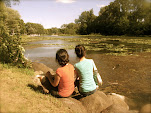10/20 - The Barricade and the Law

Eric Hazan's latest book, <La barricade: Histoire d'un objet révolutionnaire> (Autrement 2013), consists of eleven vignettes of this "revolutionary object" in French history. The first vignette concerns the religious wars of 1570-1580s, when a Catholic-dominated Paris rose up against the Protestant successor to the throne, Henry the Navarre, and Hazan identified this moment as the earliest usage of the word "barricade" to describe some sort of improvised barrier in popular resistance to governmental forces. The barricade of the Baroque era, however, shared little in common with its heroic reappearance in the years *after* the French Revolution of 1789. It was not until after the victory of the 1830 Revolution when the barricade was enthroned as a heroic revolutionary object in French history, and later portrayals repeatedly invoked iconic images such as Eugene Delacroix in La liberté guidant le peuple. In it, students, workers, and Bohemians fought side by side in solidarity. The very longevity of this Romantic image, however, risks obscuring the fact that barricades, as a strategic prop of urban conflict, hardly enjoyed any success after June 1848. When cannons were brought in for the preservation of public order, the barricade becomes more of a symbolic gesture, a theatrical prop - more than anything else. So it was in the last days of the Paris Commune in 1871. So it was in the student protest of 1968. Hazan suggests that the barricade shall live on not in its original physical form (furnitures, make-shift objects picked up from the streets, flags, etc.), but perhaps in the *blockage* of other repressive forces in other arenas.
Many parts of the present book have already been presented in one of Hazan's previous books, <The Invention of Paris> (English translation available from Verso in 2010). In it, Hazan reconstructed city maps marked with the locations of barricade, a lot of which he used again in the present book. Quoting copiously from contemporary authors, among whom most prominently Victor Hugo, Hazan was explicit in his admiration for Hugo's vivid and soul-searching prose. For those who get to know Hugo primarily from the Broadway reconstruction of <Les Miserables>, it might be sobering to read how Hugo emerged from his guilty conscience after siding with the establishment in June 1848 to create this powerful tale of personal redemption. While present-day mobilization of Hugo tends to play up the heroic, upbeat side of it ("Did you hear the people sing?"), it is striking how the story was written *after* the heyday of the real barricade, in an altered age when Bourgeoisie horror of the mob held the day. The tension between Javert, ever the guardian of law and public order, and Jean Valjean, fugitive, guilty of past crimes, but closer than anyone to the idea of human compassion, ought to be the real take away from Hugo's tour de force.
A couple of weeks ago the world's media witnessed the speedy construction of barricades on the streets of Hong Kong, which was followed by equally speedy (if messy) destruction overnight. While the pro-activist side was quick to invoke the iconic, ever theatrical power of the barricade, the pro-establishment organs dutifully play the practical role by attacking the barricade as "unlawful," "naïve," and "dangerous." To the chagrin of those who cared, "Did you hear the people sing" has become one of the mainstays of popular protest in Asia today - I never liked it, for how can it bring real solidarity across social strata, if only the English-speaking, Broadway-following crowd could feel the elation after singing it? In any case, what's important is the mix-up of roles here in this new chapter of the barricade's history - the communists (and local financial gurus) backing up the rule of law, while old enemies of the barricade voicing support for the protestors from Europe and the US. It is both anachronistic and dangerous to interpret the Barricade only as an icon of some non-existent revolutionary past. And reading Hazan at least gives one pause to think what has happened between now and then.
Labels: politics


0 Comments:
Post a Comment
Subscribe to Post Comments [Atom]
<< Home